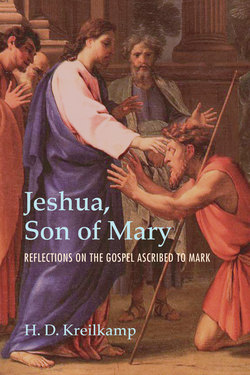Читать книгу Jeshua, Son of Mary - H. D. Kreilkamp - Страница 9
На сайте Литреса книга снята с продажи.
Chapter 3
ОглавлениеThis chapter of Mark begins with a healing that Jeshua performed on the Sabbath. His critics, the Pharisees, sat in the synagogue waiting to see what Jeshua would do for a man with a withered hand. (Had he been planted there, perhaps just to test Jeshua?) Upon entering the synagogue, Jeshua saw the man and sized up the situation. As for his critics, he saw that they weren’t concerned about the plight of the poor man. They were just hoping to witness Jeshua doing something on the Sabbath that wasn’t allowed.
Confronting the Pharisees, Jeshua asked a few questions that had implications back to creation itself. What was the purpose of the Sabbath? he asked. Keeping it holy, as the Creator commanded Moses? Surely. But what did this mean? Jeshua interpreted the Sabbath to be a gift that should be cherished as a way of enhancing life as well as promoting the worship of God. By contrast, sad to say, his critics viewed the Sabbath as a sacred rule that didn’t allow exceptions. The Sabbath was a binding law that must be observed meticulously. In other words, their interpretation of Sabbath had made it into a burden rather than a blessing.
Healing in those days was considered to be the province of professional healers. Today we call these people doctors, medics, or nurses. Jeshua, though he was not a so-called professional healer, considered his ability to heal a gift, an act of mercy, of kindness—something good. In no way did he consider his abilities to be incompatible with his mission or the Sabbath rest intended by the Creator. In his view the Sabbath law was something that God intended to assure us a welcome rest. The Sabbath was not intended to be something that restricted good works. Jeshua, in John’s version of the good news (10:10), would sum up his abilities with these words: “I came so that they may have life and have it more abundantly.” In Mark’s version of the good news, Jeshua considered his abilities to be simply a good thing. So he called the man with the withered hand to come up front. Then he challenged his critics in front of them: “Is it lawful to do good on the Sabbath rather than to do evil? To save a life rather than to destroy it?” (Mark 3:4).
Their response was silence. In no way could any of them in the synagogue deny those were two lawful options. Yet Jeshua’s critics harbored dour thoughts in their hearts, holding tightly to their position that the Sabbath was inviolable. They hoped Jeshua would say or do something against the Sabbath rest, for which they could take him to court. They thought that perhaps they could nail Jeshua for healing on the Sabbath. So they gave no acknowledgment that healing a man could be a good thing, an act of kindness, of mercy, even on the Sabbath.
Jeshua looked around at the faces of his critics and glared. Deeply grieved by his critics’ hardness of heart and lack of compassion for the handicapped one in their midst, Jeshua then said to the man, “Stretch out your hand!” The man did so, and his hand was healed instantly. The majority of people in the congregation undoubtedly rejoiced and praised God, just as they had done when Jeshua healed the paralytic who had been lowered before him from the ceiling of the house. But Jeshua’s act of compassion in the synagogue must have been a mighty blow to the Pharisees! This much is evident from their immediate rise and departure from the synagogue.
We then learn from Mark’s account that the Pharisees went at once to their opponents, the Herodians, who were collaborators with the Romans. Instead of opposing the Herodians for collaborating with the occupying powers as they had previously done, the Pharisees joined forces with the Herodians against Jeshua. The Pharisees hated Jeshua so much that they were willing to make a deal with their opponents to do away with him. The battle lines in this war had formed—an omen for Jeshua about what lay ahead for him, and for those who would follow him—for Jeshua’s enemies then planned to have him put to death.
